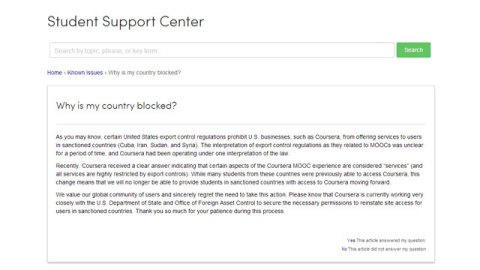US Government Shuts Down Access to Online Courses in Syria, Sudan, Iran and Cuba

Coursera is a service that allows top universities around the world to share their material online. Without spending a penny I’ve completed courses on Coursera from universities including Stanford and Caltech on topics ranging from science writing and law to neuroscience and clinical problem solving. My experience was overwhelmingly positive.
As of today, the gift of free education is cut off from some of the countries that need it most, indeed countries so torn by turmoil that online education may be one of the few remaining life lines. These are countries where Coursera has the power to change otherwise hopeless lives, countries where attending a bricks and mortar university is in many cases not an option due to ongoing conflict.
Below is an email sent earlier today from a lecturer on the course “Constitutional Struggles in the Muslim World” to students in Syria, Sudan, Iran and Cuba:
Dear All, I write this email under protest and with a considerable degree of anger and sadness. Few things illustrate the bone-headedness, short-sightedness, and sheer chauvinism of the political structure of the United States better than the extent to which its ideologues are willing to go to score cheap domestic political points with narrow interests in the pursuit of a sanctions regime that has clearly run its course.
You might remember the Apple ad from a few years back, in which the company proudly announced that their machines were now so powerful that they fell under export restrictions: “For the first time in history a personal computer has been classified as a weapon by the US government …”
Well, that was a tongue in cheek quip at their Wintel competitors, but a few years after that same company decided that also an iPad apparently could now a weapon, in a rather cowardly anticipatory cow-tow to an ever expanding and aggressive sanctions regime, when they stopped selling any of their products to anyone who happened to SPEAK Persian in their stores (the company has since lifted that idiotic policy):
http://www.bbc.co.uk/news/world-us-canada-18545003
But you will now be interested to hear that also my course (and anything else Coursera offers) has been classified, if not a weapon that could be misused, then at least a “service” and as such must not fall into the hands of anybody happening to live in the countries that the United States government doesn’t like. I have thus been informed that my students in Cuba, Syria, Sudan and my homeland will no longer be able to access this course. I leave it to you to ponder whether this course is indeed a weapon and if so against what and what possible benefit the average American citizen could possibly derive from restricting access to it.
Be this as it may, I invite those students affected to use services such as hola.org or VPN routers to circumvent these restrictions.
Let me reiterate that I am appalled at this decision. Please note that no-one at Coursera likely had a choice in this matter!
At any rate, rest assured that these are not the values of the University of Copenhagen, of its Faculty of Law, and most assuredly not mine!
Let me end on a personal note: as a recipient of a McCloy Scholarship created to foster trans-Atlantic friendship and as someone who spent some of his most formative years in the United States, I have to admit that I am worried about the path this country is descending to. Blocking teaching (and medicine) from people whose government one doesn’t like is a fallback into the darkest hours of the last century. As my teacher at MIT, Prof. Stephen Van Evera would have told the people responsible for this: your mothers would not be proud of you today.
Your instructor,
Prof. Dr. Ebrahim Afsah Faculty of Law
University of Copenhagen
PS: Below an excerpt of the communication I received from Coursera; I know from previous engagements that there is absolutely nothing they can do in the current legal climate in the United States:
“As some of you already know, certain U.S. export control regulations prohibit U.S. businesses, such as Coursera, from offering services to users in sanctioned countries (Cuba, Iran, Sudan, and Syria). The interpretation of the export control regulations in the context of MOOCs has been ambiguous up until now, and we had been operating under one interpretation of the law. Last week, Coursera received definitive guidance indicating that access to the course experience is considered a service, and all services are highly restricted by export controls.In particular, the notion of “services” includes offering access to human grading of quizzes and assessments, peer-graded homework, and discussion forums. Regrettably, Coursera must therefore cease offering MOOC access to users in certain sanctioned countries in order to ensure compliance with these U.S. laws and to avoid serious legal ramifications.”
PPS: I don’t think it is very constructive to voice your opposition to Coursera, as they can’t do anything about it anyway. If you feel you must voice your discontent, direct it at the political representatives who are responsible for this situation, i.e. your congressman or -woman if you are a US citizen or the local US representation if you are not.
To keep up to date with this blog you can follow Neurobonkers on Twitter, Facebook, RSS or join the mailing list.





